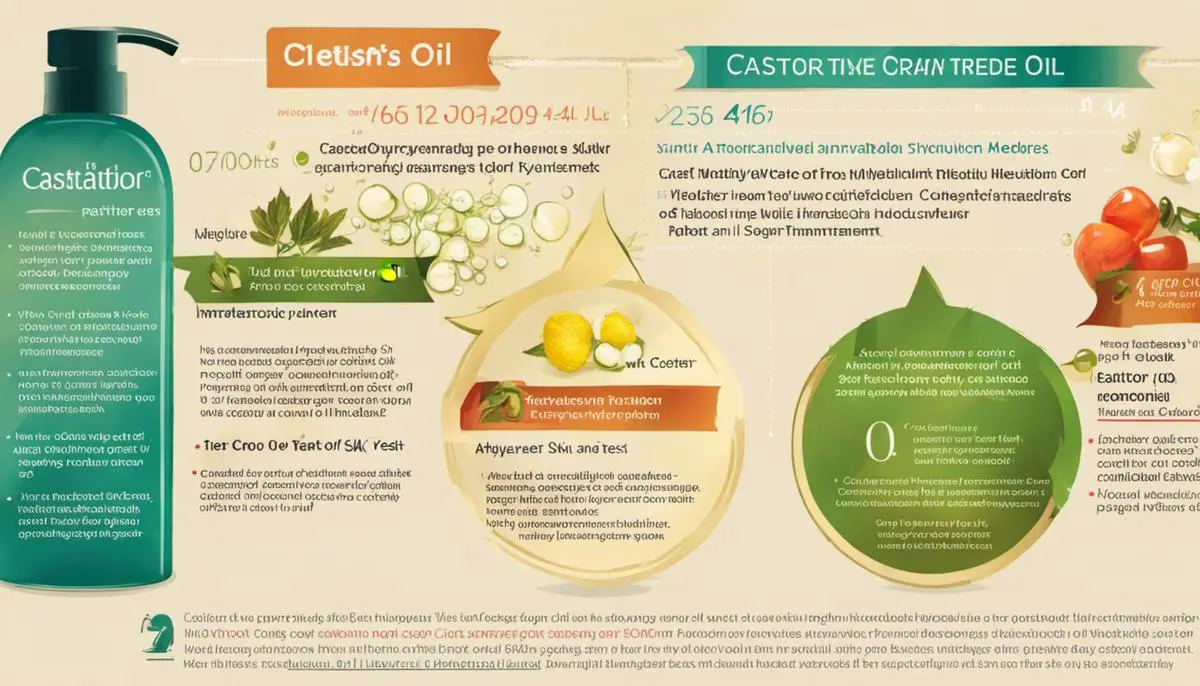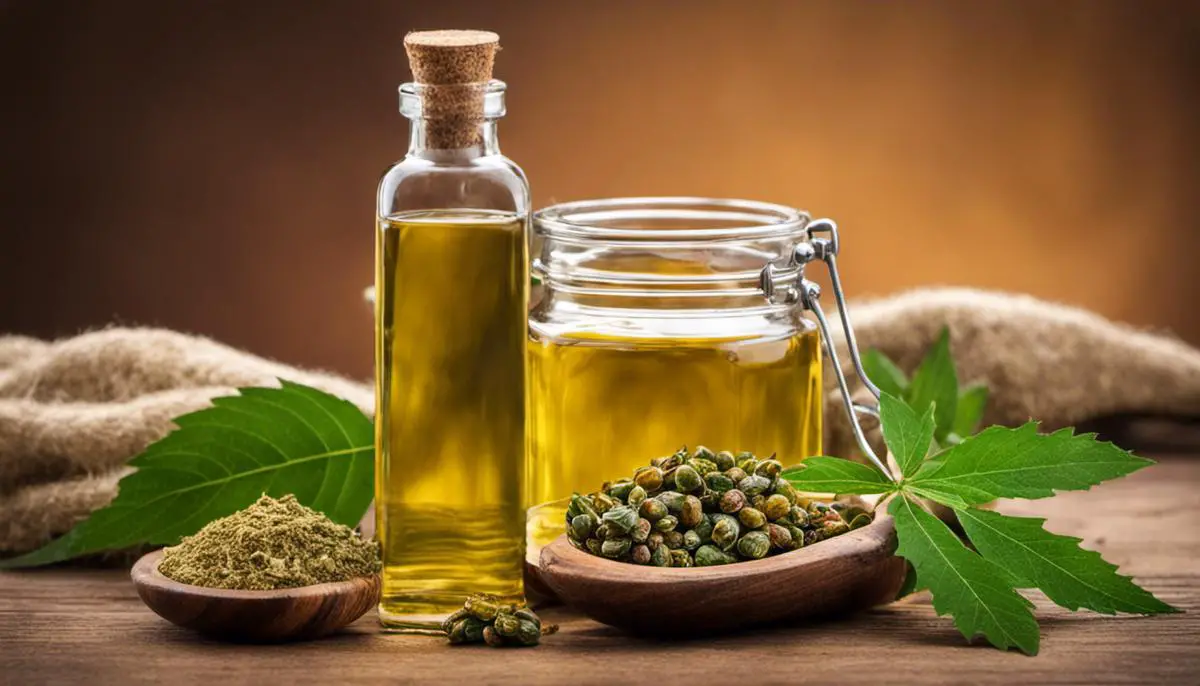Given the plethora of natural products touting their skin health benefits, it can be difficult to separate fact from fiction. Castor oil, a product you’ve likely heard of in various health and beauty contexts, deserves your attention given its long history and scientifically recognized benefits. This multi-purpose oil, extracted from the seeds of the Ricinus communis plant, has proved its worth in treating various skin conditions, promoting skin health, and enhancing beauty routines. This guide will delve into the origins, benefits, risks, and practical applications of castor oil, providing a comprehensive perspective on its key role in skincare.
Understanding Castor Oil
Origin and Extraction of Castor Oil
Castor oil is a vegetable oil obtained from the seeds of the Ricinus communis plant, native to the Mediterranean region, Eastern Africa, and India. This heavy, pale-yellow oil is extracted through a process called cold pressing, which involves crushing the seeds under high pressure to release the oil without using heat, thus preserving its beneficial properties.
Composition of Castor Oil
The primary chemical constituents of castor oil are ricinoleic acid (85-95%), oleic acid (2-6%), and linoleic acid (1-5%). Ricinoleic acid, a monounsaturated fatty acid, is the primary ingredient responsible for the oil’s unique healing properties and is not found in any other substance. It is this acid that contributes to castor oil’s anti-inflammatory, antimicrobial, and moisturizing properties.
Traditional and Scientific Uses for Castor Oil
Traditionally, castor oil has been used topically for its anti-inflammatory and antibacterial effects. Worldwide, folk medicine traditions utilize this oil to treat a variety of skin conditions like acne, dermatitis, and psoriasis. Modern science supports several of these traditional uses.
Current scientific research has found that castor oil has several therapeutic properties beneficial to the skin. These include antimicrobial and anti-inflammatory properties, making it potentially beneficial for treating bacterial skin infections and inflammation-related skin conditions. Moreover, it is considered a natural moisturizer due to its ability to retain moisture on the skin.
Pros of Castor Oil for Skin
One of the main benefits of using castor oil for skin care is its hydrating capabilities. Being rich in fatty acids, it can replenish the skin’s natural moisture balance. It is also found to promote wound healing and reduce acne due to its anti-inflammatory properties. Plus, its antibacterial nature can help combat bacterial skin infections.
It is also often used for its potential anti-aging benefits. The antioxidant qualities of castor oil can help increase collagen and elastin production, which can lead to improved skin elasticity and reduced wrinkles.
Potential Disadvantages of Castor Oil for Skin
Castor oil, although naturally beneficial, does possess a few potential disadvantages that merit consideration. For starters, it’s a highly comedogenic substance, implying that it can potentially clog pores and intensify acne issues, especially for individuals with oily skin types.
Furthermore, certain individuals may exhibit an allergic reaction to castor oil, experiencing symptoms such as skin redness, irritation, and itchiness following application. Therefore, it’s advisable to perform a patch test prior to incorporating castor oil into your regular skincare regimen.
In addition, the thick and somewhat sticky consistency of castor oil might not appeal to all, particularly because it can be challenging to wash off. This could discourage some individuals from incorporating castor oil into their everyday skincare routine.
Finally, castor oil shouldn’t be viewed as a substitute for any medically prescribed skin treatments or medications. Always use it under the guidance of a healthcare professional and as a supplementary treatment rather than the main one.

Benefits of Castor Oil for Skin
Pros of Using Castor Oil for Skin
Despite some potential disadvantages, there are numerous advantages to using castor oil for skin care. One major advantage is its hydrating and moisturizing properties. Having a rich content of ricinoleic acid – a monounsaturated fatty acid, castor oil plays a significant role in promoting skin health. A 2019 study published in the International Journal of Molecular Sciences emphasizes the profound humectant properties of this fatty acid, thereby asserting that castor oil can draw in moisture from the surrounding environment into the skin, aiding in skin hydration.
Moreover, castor oil is known for its remarkable anti-inflammatory properties. The ricinoleic acid in castor oil not only acts as an analgesic but also exhibits anti-inflammatory effects. This can provide relief in cases of skin disorders that involve inflammation, such as psoriasis and eczema. A research paper published in 2010 in the “Journal of Ethnopharmacology” supports this claim.
Castor Oil Reducing Acne
Castor oil is frequently used to treat acne due to its anti-bacterial property. According to a study published in the Journal of Dental and Medical Science in 2016, castor oil was effective in inhibiting bacterial growth, including the bacteria associated with acne development – Propionibacterium acnes.
The oil promotes a healthy skin complexion and enhances the skin’s elasticity, primarily due to its high content of fatty acids that help improve skin structure. Applying topical castor oil may also reduce signs of aging by promoting collagen and elastin production, minimizing the appearance of wrinkles and fine lines, although more research is needed to solidify these claims.
Understanding the Potential Drawbacks of Castor Oil
Despite the numerous advantages, castor oil is not without its potential drawbacks. While beneficial for many, some individuals might exhibit allergic reactions to castor oil. Reactions could manifest as rashes, itching, swelling, or even dizziness. Hence, a patch test is recommended prior to applying castor oil over a large skin surface.
Furthermore, the robust properties of castor oil might be overly intense for people with sensitive skin, instigating irritation or worsening of existing skin conditions. Plus, while it’s recognized for its anti-acne qualities, excessive use of castor oil might, paradoxically, clog pores and amplify acne symptoms, attributed to its highly viscous or dense nature.
Importantly, remember that castor oil, no matter how skin-friendly, should not be considered a replacement for medical treatment. If you are battling a skin condition, consult with a dermatologist instead of self-treating with castor oil, unless guided by a healthcare professional. Ideally, castor oil should complement a well-rounded skincare regimen and not be relied upon as a solitary treatment.

Potential Risks and Precautions
Underlining the Perks and Drawbacks of Utilizing Castor Oil for Your Skin
A potent product of the Ricinus communis plant, castor oil, is much talked about in skincare circles for its beneficial hydrating properties and anti-inflammatory characteristics. Its popularity predominantly stems from the usefulness in treating diverse skin conditions from acne to dry skin. However, for all its advantages, castor oil also presents a set of potential hazards and precautions that should be given careful consideration before it being employed as a skin treatment.
One prevalent downside linked to castor oil is its propensity to cause skin irritation. Some users may experience a degree of redness, itchiness, or mild discomfort upon applying this oil. Blame for such discomfort often falls on the powerful fatty acids within the oil that are known for disturbing the skin barrier, particularly in those with delicate skin. Overdependence or excess use of castor oil can also trigger adverse reactions even in those who possess relatively resilient skin.
Allergic responses, albeit rare, can be fatal when caused by castor oil. Symptoms that might indicate an allergic reaction might include rashes, hives, and occasionally breathing difficulty. In case of encountering any such symptoms after using castor oil, users are advised to immediately discontinue use and seek prompt medical assistance.
Castor oil, due to its potent nature, may cause a negative response given certain skin conditions, for instance, eczema or rosacea, exacerbating these ailments and inducing flare-ups. Prior consultation with a dermatologist is highly recommended for individuals plagued by such skin disorders before they experiment with castor oil.
Pregnant women are advised to steer clear of castor oil, especially in large quantities, owing to its potential to induce the release of prostaglandins, which could possibly stimulate contractions. It is also typically recommended that breastfeeding women avoid castor oil given the uncertainty surrounding the transmission of its components through breast milk.
In spite of its potential issues, the moisturizing and anti-inflammatory properties of castor oil can greatly benefit the skin. That said, it is necessary to perform a patch test prior to incorporating any new product, including castor oil, into your skincare regimen to help detect any potential allergic reactions.
The application of castor oil should also be restricted around the eyes or mucous membranes, due to its ability to cause acute irritation. The user is advised to exercise a high degree of caution while applying this oil to minimize any long-term damage.
Finally, when purchasing castor oil, it is crucial to ensure that it is pure, cold-pressed, and devoid of hexane. Hexane, commonly used in the extraction process of many oils, can harm the skin. Only pure oil can guarantee maximum benefits devoid of any damaging additives.

How to Apply Castor Oil for Skin Care
Guiding you through the application of Castor Oil for Improved Skin Health
Introducing castor oil in your skin-care regimen is a simple process. Pour a modest quantity of the oil onto a sterilised cotton ball or pad. Gently dab the oil onto your face or any other sections of the body requiring treatment, leave it on for a few minutes, and then rinse it off using warm water. This application routine can be repeated twice daily, depending on individual needs and skin sensitivity.
For precisely addressing concerns such as acne or scars, castor oil can be directly applied to the affected spots. For optimal absorption, it is recommended to leave the oil on overnight and wash it off the next morning.
Castor oil can be utilised as a moisturizing agent by fusing it with other soothing oils like coconut oil or jojoba oil. Apply the mixture like you would any regular moisturizer, gently massaging it into the skin, followed by air drying.
A simple at-home face mask can be prepared using one tablespoon of castor oil blended with an egg yolk and a teaspoon of honey. Apply this mask to your face, allow it to sit undisturbed for 15-20 minutes, and subsequently rinse it off with warm water.
Pros of Using Castor Oil for Skin Care
Castor oil is rich in ricinoleic acid, a monounsaturated fatty acid, which acts as a humectant and can help moisturize and hydrate the skin. Its antibacterial properties make it beneficial for those with acne, and its anti-inflammatory properties can help reduce swelling and puffiness.
Benefits of using castor oil on your skin include the ability to boost collagen and elastin production, which can help reduce the appearance of wrinkles and keep your skin looking young and fresh. It can help soothe inflamed and irritated skin, making it beneficial for conditions like dermatitis and psoriasis.
Additionally, castor oil has been traditionally used to promote wound healing and reduce scarring, although clinical evidence to support these uses is somewhat limited.
Cons of Using Castor Oil for Skin Care
Though it comes with a multitude of benefits, castor oil is not without its potential downsides. It is a very thick oil and can clog pores, leading to an increase in blackheads and breakouts, especially for those with oily skin.
Castor oil has a fairly strong smell which some people may find unpleasant. It is also likely to cause allergic reactions in individuals who are sensitive to it, leading to symptoms such as rashes or hives.
The oil is highly potent and should be used sparingly, as overuse can lead to skin irritation and dryness. When using any new product, it is recommendable to perform a patch test to ensure that it will not cause an adverse reaction.
Moreover, while many have acclaimed the benefits of castor oil, its effects are not universally agreed upon in the scientific community. More research is needed to fully ascertain and substantiate its various skin benefits.

Photo by houcinencibphotography on Unsplash
From this comprehensive journey into the world of castor oil, it’s evident that its benefits for skin health and care are significant, backed by traditional wisdom and scientific studies. The oil’s inherent characteristics such as hydrating properties, acne reduction abilities, and promotion of skin elasticity can be indispensable for those pursuing natural skincare solutions. However, the importance of using castor oil responsibly, being aware of potential side effects, and taking necessary precautions can’t be overstressed. Following the indicated application methods will ensure you maximize the benefits while minimizing potential risks. The magic of nature is right at your fingertips, and with knowledge comes the power to transform your skincare regime.
